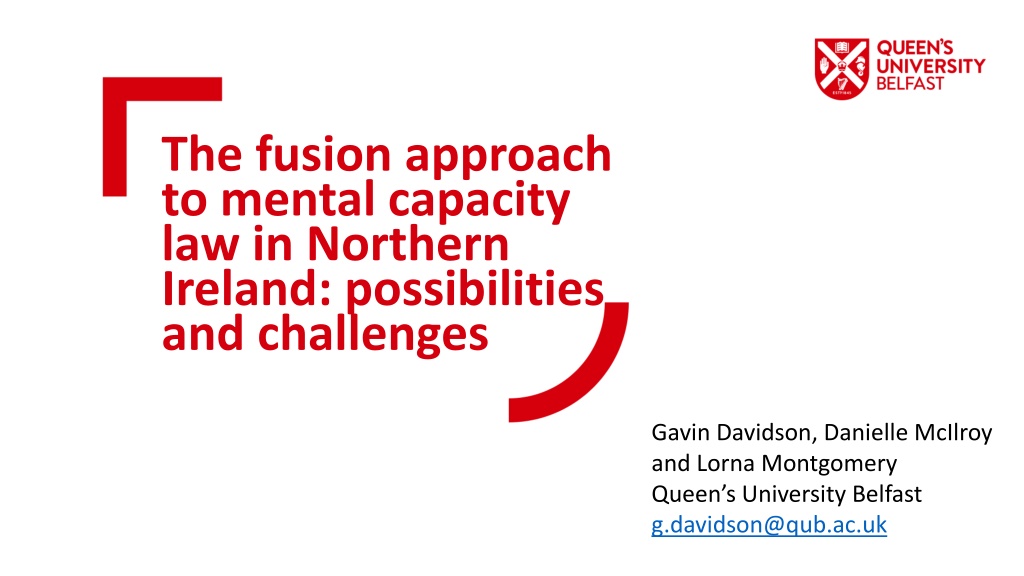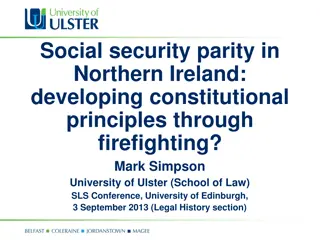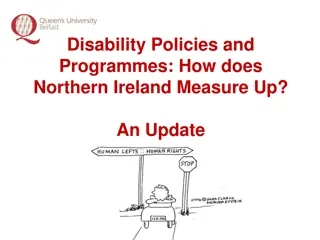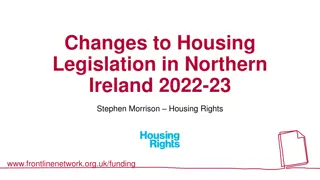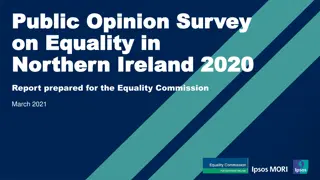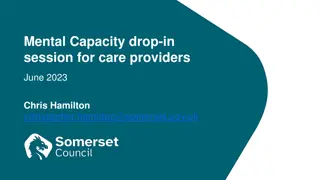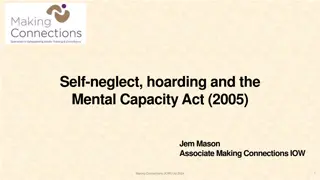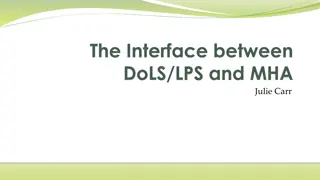Exploring The Fusion Approach to Mental Capacity Law in Northern Ireland
Delve into the possibilities and challenges presented by the fusion approach to mental capacity law in Northern Ireland. Understand the rationale for change, the development and implementation of the Mental Capacity Act (Northern Ireland) 2016, and ongoing possibilities and challenges. Examine different approaches to developing the legislative framework for decision-making when a person is unable to do so, emphasizing the need for fair and open decision-making processes to protect individuals' rights.
Download Presentation

Please find below an Image/Link to download the presentation.
The content on the website is provided AS IS for your information and personal use only. It may not be sold, licensed, or shared on other websites without obtaining consent from the author. Download presentation by click this link. If you encounter any issues during the download, it is possible that the publisher has removed the file from their server.
E N D
Presentation Transcript
The fusion approach to mental capacity law in Northern Ireland: possibilities and challenges Gavin Davidson, Danielle McIlroy and Lorna Montgomery Queen s University Belfast g.davidson@qub.ac.uk
Overview of the presentation Rationale and context for change Development of the Mental Capacity Act (Northern Ireland) 2016 Implementation of the Mental Capacity Act (Northern Ireland) 2016 Ongoing possibilities and challenges Presentation based on a chapter The Fusion Approach to Mental Capacity Law in Northern Ireland: Possibilities and Challenges by Gavin Davidson, Martin Daly, Moira Harper, Danielle McIlroy and Lorna Montgomery for Capacity, Participation, and Values Edited by: Camillia Kong, John Coggon, Penny Cooper, Michael Dunn & Alex Ruck Keene; and presentation at University of Bristol in March 2022
Rationale for change Why do we need any mental health and/or mental capacity based law? There are times when people s ability to make decisions is so impaired that they are unable to make the relevant decision The causes of impairment may be wide and varied, including physical health problems, mental health problems, alcohol and drug use, intellectual disabilities and dementia A process is needed to ensure those decisions are made in a fair and open way that protects the person s rights There may be ongoing and helpful debates about how to best assess decision making ability but it seems reasonably clear that this problem arises and some form of legal framework is needed
Rationale for change Range of possible approaches to developing the legislative framework for decisions to be made when a person is unable to make them Review the current legal framework, identify relevant developments in case law, explore similar laws and updates in other jurisdictions and then consider how the current laws could be further developed May neglect more fundamental questions about whether the current laws are the best available approach (belief perseverance?) Having a separate mental health law for only some forms of impairment, with different criteria for decision-making, is discriminatory and so just revising and updating the current mental health law may be an improvement but will not address this basic inequity
Rationale for change One non-discriminatory possibility is the fusion approach having a capacity based legal framework for all (Campbell and Heginbotham, 1991; Dawson and Szmukler, 2006) Arguably this is a positive response to the UNCRPD s Article 12 of equal recognition before the law (use of legal/mental capacity and polarized positions probably unhelpful) Possible concern about supported decision making being stretched to include when someone else is making the decision Overlap between best interests and interpretation of will and preferences (if sufficiently impaired, should not be absolute) Also important to distinguish between Szaszian type perspectives and the need to try to prevent and reduce the use of force
Northern Ireland context History of political conflict high awareness of issues of discrimination and rights Bamford Review 2002-2007 very inclusive process Timing complicated developments in other jurisdictions Concluded in 2007: The Review considers that having one law for decisions about physical illness and another for mental illness is anomalous, confusing and unjust Northern Ireland should take steps to avoid the discrimination, confusion and gaps created by separately devising two separate statutory approaches, but should rather look to creating a comprehensive legislative framework which would be truly principles-based and non- discriminatory.
Development of the Mental Capacity Act (Northern Ireland) 2016 Jan-Mar 2009 Department of Health consultation September 2009 Department of Health announced one law Project Board, Project Team and Reference Group July-Oct 2010 Equality impact consultation June 2011 Instructions to Office of Legislative Consul July-Oct 2012 Department of Justice consultation May-Sept 2014 Joint Health and Justice consultation May 2015 Ad-Hoc (Health and Justice) Committee March 2016 passed by Assembly 9th May 2016 Royal Assent
Development of the Mental Capacity Act (Northern Ireland) 2016 15 Parts, 308 Sections and 11 Schedules Similar to the Mental Capacity Act 2005 but should have changed the name Statutory principles including support and best interests Test impairment or disturbance (ECHR Art 5), functional and causal link Functional understand, retain, appreciate the relevance and use and weigh; communicate Tiered safeguards principles; formal assessment of capacity; consultation with the nominated person; for deprivation of liberty the prevention of serious harm condition and authorisation by panel (or short-term detention in hospital)
Implementation of the Mental Capacity Act (Northern Ireland) 2016 First phase of implementation proceeded in 2019 1st October 2019 provisions relating to research 2nd December 2019 provisions relative to deprivation of liberty Full implementation in current Mental Health Action Plan and Strategy 2021-2031 Until full implementation the Mental Health (Northern Ireland) Order 1986 to be used when it applies Proposed plan for 22/23 to commence remaining civil aspects of the Act, including the advocacy safeguard Final stage may then be the justice aspects of the Act
Ongoing possibilities and challenges Training for partial implementation focused on knowledge Approaches to more skills-based applied training being developed Assessment of capacity, and the support and best interests principles Potential to further streamline administrative aspects Application in physical health settings expected number of applications to Trust panels (re deprivation of liberty in community settings) but many fewer than expected Short Term Detention Authorisations (for short term detention in hospital settings) Parallel development of Advance Care Planning policy (and MCA includes commitment to review framework for ADRT)
Ongoing possibilities and challenges No date set for full implementation Wider issues of resourcing and prioritisation Will expand the scope of compulsory intervention (personality disorder, substance use, community, POSH) but also the associated safeguards Exclusion of those under 16 Application to the criminal justice system for treatment but not detention/court powers possibility of prolonged detention? Proposed separate Adult Safeguarding law Need for routine data collection and research to assess whether it does better promote and protect people s rights
Related publications and projects Danielle McIlroy s PhD project on best interests Anne Campbell leading a systematic review of the literature on compulsory intervention for substance use Davidson, G. (submitted chapter) An alternative to mental health law: the Mental Capacity Act (Northern Ireland) 2016 , for Donnelly, M. & Kelly, B.D. Routledge Handbook of Mental Health Law Farrell, A-M., Davidson, G., Donnelly, M., Agnew, E., Forbes, T., & Frowde , R. (2022). Mental health policies and laws on the island of Ireland. (pp. 1-42). (Edinburgh School of Law Research Paper Series). The University of Edinburgh. Webb, P., Davidson, G., Edge, R., Falls, D., Keenan, F., Kelly, B., McLaughlin, A., Montgomery, L., Mulvenna, C., Norris, B., Owens, A., & Irvine, R. S. (2020). Key components of supporting and assessing decision making ability. International Journal of Law and Psychiatry, 72. https://doi.org/10.1016/j.ijlp.2020.101613 Webb, P., Davidson, G., Edge, R., Falls, D., Keenan, F., Kelly, B., McLaughlin, A., Montgomery, L., Mulvenna, C., Norris, B., Owens, A., & Irvine, R. (2020). Service users' experiences and views of support for decision making. Health and Social Care in the Community, 28, 1282-1291. https://doi.org/10.1111/hsc.12961 Davidson, G., Adell, T., & Morrison, A. (2020). The development of a non-discriminatory alternative to mental health law, the Mental Capacity Act (Northern Ireland) 2016. Journal of Elder Law and Capacity, 2020(1), 68-78. Harper, C., Davidson, G., & McClelland, R. (2016). No Longer Anomalous, Confusing and Unjust : The Mental Capacity Act (Northern Ireland) 2016. International Journal of Mental Health and Capacity Law , (22), 57-70.
